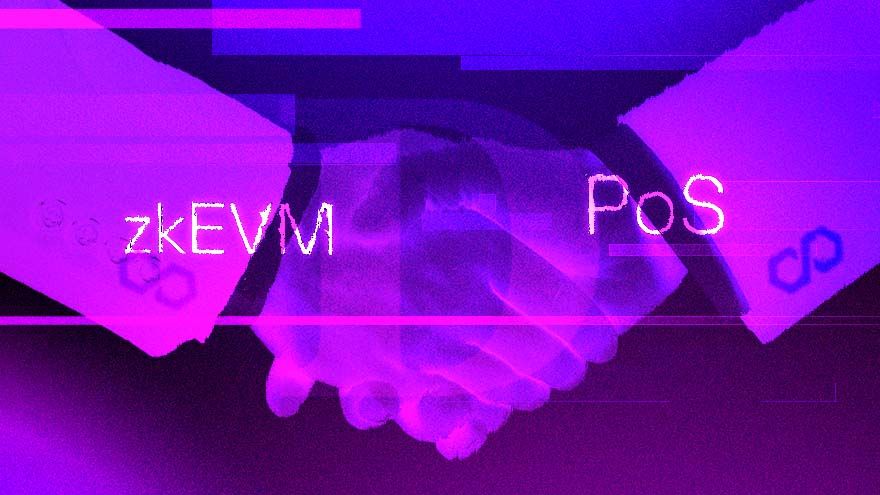[ad_1]
Engineers at Polygon, a leading Ethereum scaling team, have published a proposal to transition its PoS sidechain into a rollup-like zero-knowledge-powered validium.
The PoS Chain is the largest network within Polygon’s ecosystem, with a DeFi TVL of $930M, and processes 2.5M transactions daily. However, the chain has received few upgrades while Polygon focussed on advanced zero-knowledge-based scaling solutions following its $1B allocation toward ZK technologies in 2021.
“This is a major milestone for the Polygon ecosystem, as it would enable Polygon PoS to become more secure, more performant, and a core part of the Polygon 2.0 ecosystem,” Polygon said in an announcement.
Polygon emphasized that the upgrade would allow existing dApps to continue operating without changes once the PoS chain transitions into a zero-knowledge L2. The upgrade could go live before the end of Q1 2024 if a consensus is easily reached on the proposal.
Polygon’s MATIC token is up over 6% in the past 24 hours.

Polygon 2.0
The news comes after Polygon recently unveiled plans to reorganize into a unified multichain ecosystem of ZK-secured networks called Polygon 2.0.
Polygon launched itszkEVM in March,deployed the mainnet beta for its hybrid rollup Nightfall last May, and rolled out its Layer 3 architecture, Supernets, in April 2022. Polygon also continues to develop Miden, a ZK-STARK-based L2.
Currently, the PoS chain is Polygon’s sole deployment that isn’t leveraging zero-knowledge proofs despite housing the lion’s share of Polygon’s TVL.
zkEVM Validium
Polygon describes a validium as a “lower-cost, higher-throughput sibling of a rollup.”
Rollups bundle together transactions on Layer 2 before submitting them to the Ethereum mainnet for finalization in batches, significantly reducing the fees associated with each individual transaction.
A validium’s key differentiating feature is that transaction data is published off-chain to offer greater transaction throughput and reduced fees. Polygon’s ecosystem of more than 100 validators staking $2B worth of its native token will provide data availability services in place of Ethereum for zkEVM validium.
Polygon’s validators will also provide transaction sequencing services after the upgrade. MATIC will continue to function as the network token, and its economics will remain the same.
The proposed upgrade would also transition the PoS Chain into a zkEVM, meaning it supports code written for the Ethereum Virtual Machine and is secured by zero-knowledge proofs.
[ad_2]
Read More: thedefiant.io









 Bitcoin
Bitcoin  Ethereum
Ethereum  Tether
Tether  XRP
XRP  Solana
Solana  USDC
USDC  TRON
TRON  Dogecoin
Dogecoin  Lido Staked Ether
Lido Staked Ether  Cardano
Cardano  Wrapped Bitcoin
Wrapped Bitcoin  Hyperliquid
Hyperliquid  Wrapped stETH
Wrapped stETH  Sui
Sui  Bitcoin Cash
Bitcoin Cash  Chainlink
Chainlink  LEO Token
LEO Token  Stellar
Stellar  Avalanche
Avalanche  Toncoin
Toncoin  WhiteBIT Coin
WhiteBIT Coin  USDS
USDS  Shiba Inu
Shiba Inu  WETH
WETH  Wrapped eETH
Wrapped eETH  Litecoin
Litecoin  Binance Bridged USDT (BNB Smart Chain)
Binance Bridged USDT (BNB Smart Chain)  Hedera
Hedera  Monero
Monero  Ethena USDe
Ethena USDe  Polkadot
Polkadot  Bitget Token
Bitget Token  Coinbase Wrapped BTC
Coinbase Wrapped BTC  Uniswap
Uniswap  Pepe
Pepe  Pi Network
Pi Network  Aave
Aave  Dai
Dai  Ethena Staked USDe
Ethena Staked USDe  OKB
OKB  Bittensor
Bittensor  BlackRock USD Institutional Digital Liquidity Fund
BlackRock USD Institutional Digital Liquidity Fund  Aptos
Aptos  Cronos
Cronos  Internet Computer
Internet Computer  NEAR Protocol
NEAR Protocol  Jito Staked SOL
Jito Staked SOL  sUSDS
sUSDS  Ethereum Classic
Ethereum Classic